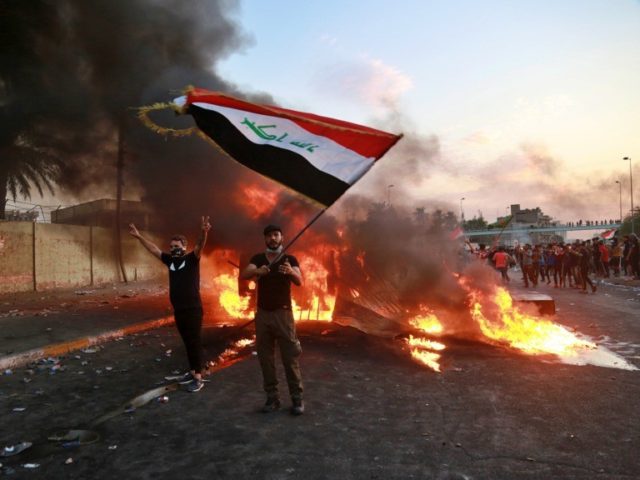In an interview with Breitbart News on Wednesday, Dr. Ali Akram Albayati of the Iraqi High Commission on Human Rights discussed the origins of the protests in Iraq, endorsed the right of the people to be heard, and mourned the loss of life during clashes between protesters and security forces.
Dr. Ali described the protests as an “explosion of public anger due to unemployment and lack of basic services” mixed with the negative reaction to several specific incidents, including the ouster of popular counter-terrorism commander Gen. Abdul-Wahab al-Saadi, the aggressive security response to academic demonstrations in September, and the “harsh dealing of local governments with the issue of slums in Iraq.”
Ali said Gen. Saadi “has a good and special reputation in the hearts of Iraqis,” so their growing disillusionment with the central government erupted when they saw him being treated shabbily after doing so much to combat terrorism in Iraq.
“It was an explosion of an accumulated pressure over the last 16 years, due to lack of the main basic services, corruption, and absence of employment opportunities,” he said.
“In general, over the short age of the new political system in Iraq, there was no attention from the political groups to build trust between them and the community which, of course, needs provision of at least the basic infrastructures and services,” he elaborated.
At the same time, Ali said Iraqis could see very well “how the political figures and their families were getting more wealthy and living in the world’s most beautiful capitals.”
Ali poignantly described the frustration of Iraqis watching their political elite enjoy the rewards of the oil industry while the people “only drink its dangerous waste products in the water, like in Basra.” The city of Basra has been suffering from an acute water quality crisis that has hospitalized over 100,000 people.
These popular frustrations were made even worse by the widespread perception of Iraq’s hard-won democracy failing, or at least performing little differently from the old tyranny, as far as the common man was concerned.
Ali spoke of a terrible sense of disappointment pervading the country as the new system was seen as “only empowering and financing some families on a sectarian or ethnic basis” and making them “powerful enough to guide all institutions in Iraq according to their will or interest, not the public’s interests.”
Responding to comments by Iraqi Prime Minister Adel Abdul-Mahdi that corruption in Iraq is an intractable problem because those corrupt interests are too powerful to defeat, Ali advised revising the national constitution and moving from a parliamentary system to a presidential model like the one employed by the United States. He said reforms would be more easily implemented through one top official “coming through direct election from all Iraqis for four years and to be monitored by the parliament.”
Ali decried the dozens killed and thousands injured during the past week of protests, finding them sadly unsurprising given the large number of weapons in Iraq and the number of outside forces prone to interfering in Iraqi politics. He pointed out that at least eight deaths and 1,200 injuries among security forces must be added to the total casualties. He said investigations into the use of force against protesters, including the use of snipers by the police, are underway.
Ali said it was important to remember that most of the security units established in Iraq after 2003 were tasked with fighting terrorism and experienced at dealing with “the most brutal groups of terrorists,” not practicing humane crowd control with strict rules of engagement when huge numbers of citizens took to the streets.
Iraq, like most other countries, is also dealing with generational transitions and the effect of the Internet on public discourse. Ali noted that “the youth now represent 60 percent of the Iraqi population and, of course, they are in daily and direct contact with all the world through social media and open communications.”
Asked if the Iraqi demonstrators are aware of, and influenced by, other high-profile protest movements like the one in Hong Kong, he observed that “any movement in any part of the world now has an influence on any community in any other part of the world, including the Iraqi people.”
He noted ruefully that Iraq’s volatile younger generation combines a higher level of online connectivity with extremely high unemployment rates and a growing drug abuse problem.
Wednesday brought some hopeful signs of calm, perhaps aided by Prime Minister Abdul-Mahdi declaring three days of mourning for those killed in the protests. Ali worried that permanent solutions to the problems that motivated the protests could remain elusive.
“It is a complex equation to balance between the right to expression and demonstration by an angry people due to accumulated problems and sufferings, and keeping the government or the situation stable,” he reflected, observing that Iraqis are well aware of how unstable the region is and they know their country, located at the crossroads of every conflict, will always find itself “in the heart of fire.”

COMMENTS
Please let us know if you're having issues with commenting.